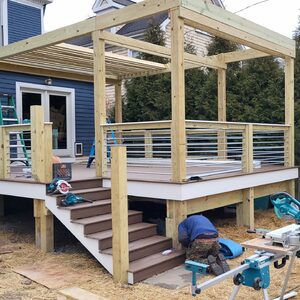Hi,
I’m in the final stages of building a shop/garage.
I hired a good GC, agreed to his $30K price and spec’d things pretty well.
One of my specs was that he was responsible for the thing meeting city building codes, etc.
He was to do foundation, framing, roofing, doors, windows..everything except paint, insulation and interior finishing.
He was to run the underground wire to my 100 amp electrical box, which he looked at before bidding and determined that it was adequate. Again, I mandated that he’d have to meet the codes, etc.
He stated in the contract that, barring weather delays, the job would be finished in 30 days.
We’re 60 days into the project… The foundation took longer…he and the foundation sub failed to realize the amount of slope in the backyard and so had to accomodate.
The framing was pretty fast, roof took longer, etc, etc. All of this has been fine…I don’t want a rushed job.
He brought in an electrician..and admitted that this was the first job he’d used this guy on…the guy’s a real jerk personally..but if he does good work, I don’t care..ya know?
First he griped that the contractor was going to have to dig the ditch…I let them settle that.
Then he said that, to meet city code, I’d have to install outside lights and one light down below (It’s two stories)..and said that, plus running some 240 wiring and boxes, would cost $600. I agreed, signed the change order, and gave him $300…
At the rough inspection, they decided that I need a light in the second floor…so I agreed..and he installed it.
At the final inspection, the inspector stated that I needed to cover the ROMEX up to 7′ (not a big deal…1 sheet of rock) and have a main breaker on my panel..since it’s a detached garage and, apparently, city codes require that.
They were supposed to come out this past Thursday night, install the sheet rock and do the main breaker….although I don’t know how…since my panel doesn’t isn’t configured for a main… No one showed up.
I called on Friday, he gave excuses saying that the electrician didn’t do as he said, that the inspector was off and couldn’t answer some questions, etc, etc. He also said that the electrician said that he’d recommended that I get a different panel in the beginning..and that he might have start over….pull new wires, buy a new box….etc, etc.
My perspective is this: I’ve been flexible and accomodating…maybe too much so. I expected the GC to know the codes and price accordingly. Maybe he should have had to pay for the outside lighting, etc to meet code….but I’m trying to be reasonable. My patience is wearing thin….I’m anticipating more delays and them coming back and saying “we need another $1000 to redo the electrical, buy another electrical panel, etc”. I’m already over budget on this….I’ve agreed to an additional $3900 in other things…at my request (some of which no price was agreed upon and for which no change order was ever presented or signed).
I basically want to tell this GC to work things out with the electrician; it’s not my problem that he or the electrician didn’t seem to know that city codes…..he bid the job, I’ve been flexible..but I’m not paying any more money..and I need them to do whatever it takes to finish this job….or I won’t pay them the final $4K owed.
Again, I’m not trying to screw anyone….I feel like I’m paying for the mistakes of the GC and the electrician.
Perspective please?
Larry


















Replies
Sounds like a lot of oversights are piling up on your GC. If your contract is for cost plus, just grab your ankles. Fortunately, it sounded like your price was set, and your GC has to honor that. He might need a reminder though. He should know( or atleast studied before he bid the job) the appropriate codes.
You need a site meeting with all parties involved and have them explain the problems and reasons why. You must write down all the problems you are aware off. Number them and leave a space for their answer. If you think you might lose your temper then have someone with you to keep you carm. Also make a list of what needs to be done to finish the job as detailed in the contract. This is not a "problem fix" list, just a job finish list. Don't be too upset if you have to pay alittle extra to meet codes as they are often interpreted in many ways.
What good is having a time clause without liquidated damages? You should have based your payments on passing inspections. Plus, there is a huge difference between having your work meet code and making the project meet code. After 30 years in this business, I would never promise that the project would pass. That is up to whoever rights the specs. Wasn't that you?
You hired a "good" GC?
Who subbed the electrical to a licensed electrician?
Who are both required to follow code, even if it means changes in the job specs?
FWIW, when "professionals" agree to a job they should have conferred on the project and all the requirements should have been hashed out before the first shovel of dirt was turned. Or before the signatures were on the dotted line. It's not reasonable that these contractors should have been that ignorant of the code, failed to research what they did not know and failed to inform you so that you could incorporate the changes in your initial contract.
It's the GC's responsibility to see to it that what you propose to have built is in fact buildable. A customer could get change ordered to bankruptcy at the contractors whim. Granted, mistakes happen, but from your side of the story I see PPPP on the part of the GC and electrician. So there!
Plus, there is a huge difference between having your work meet code and making the project meet code. After 30 years in this business, I would never promise that the project would pass. That is up to whoever rights the specs. Wasn't that you?
No offense, but if I'm hiring a professional builder, I don't think it's unreasonable to expect that my building should meet all the local codes and pass inspection as well as part of the builder's performance. Even if a homeowner lays out the specs, it would be up to the professional builder to make sure that the specs meet codes and pass inspection.
There are situation where what is asked to be built isn't code (basement or garage apartments, illegal kitchens, etc.). If that's the case, then you need to let the homeowner know that what they want you to build is against the regulations and codes in your area and what potential problems can come up. You also can then tell them that if you decide to do the project, that you won't be responsible for the consequences that arise and get it in writing (that is, if you do the job).
I never did catch what state you were from, but here in New Jersey, the only person who can spec out a job, or design it, is the owner or a licensed architect. Our building codes differ from city to city, and from month to month. Even if you build from an approved set of blueprints, there is no guarantee that it will meet code. There are just too many variables. If something pops up that doesn't meet the code, well.....oops. Sometimes there is no one at fault, and if something must be changed or added, then the client is expected to ante up. As a contractor, I am not required to be licensed. How I wish it weren't so, but that is another story. But the architect does have to be licensed, and that is why they make so much more than the builders do around here. The builder does as he is told by the owner or the architect, and those are the people who must be held accountable. Sure, we should know better, and we usually do. But I wouldn't bet money on it every time..............
I'm in NY and I am licenced.
Here, you are locked into the code at the time of permit approval. You are not required to modify to any code changes after you get your permit.
Even so, whenever I start a project that requires a permit and inspections, I get all the parties involved together including the inspector and town engineer so that we're all on the same page and that the project goes smoothly. I also sitdown with architect so that we all understand what it is that we want. You can say that it's on the blueprint and that's what you follow, but it isn't always so.
Case in point, on a set of plans for a vaulted celing in an extension, it called for a particular type of truss that was just too hard to get (we kept getting told that they weren't scheduled to build that type or some other bull). Since the final space was to have a vaulted celing, I called in the achitect and the building inspector and we three came up with an alternative plan that gave us the vaulted ceiling and that would meet codes.
Its nice when you can catch something early on; it makes you look good in front of eveybody.
One of our biggest problems here in New Jersey is that the building inspectors, and the plan reviewers, and the townships themselves, are not responsible for their own mistakes. I am working on one commercial project where the architect specced a handicap bathroom on the second floor, which is only accessible by a 36" staircase. The township approved it! I went back to the architect and questioned it, and he said to keep my fingers crossed. When it fails inspection, the town won't care what was approved on the plans. Just fix it. This happens all the time. Its not code, its whimsy.
The point is, the code is open to interpretation. I don't interpret, I build. I don't play stupid, and I won't knowingly violate the code without getting approval, as in the above example. Its always a simple case of CYA.
Larry,
I agree with Ralph...don't let them "change order you to death."
I agree with the other comments that you need to pull all parties together on the jobsite...you, the GC, electrician, and code inspector. Let the inspector tell you personally what he will sign-off on concerning your electrical situation. Once that job situation is outlined, have the GC do that specfic electrical work, and no more. Ask the inspector if some of the light installations were even necessary for passing codes, if inspector answers in the affirmative, then you know you weren't "taken" by the electrician. If inspector replies that such work was not needed, I'd take that up with the GC and possibly work out some sort of agreement.
You say you're not sure how a main breaker can be installed into your existing box?... Well, double check with your code inspector, but I believe that you can satisfy this requirement by having a "disconnect" switch mounted adjacent to your panel box. Your main feed( from your house to your garage) runs to the disconnect, then from there, into your panel box. All your other new runs coming from the panel would in no way be touched; nor should they be. The disconnect cuts service to your panel; period...just like a main would do if mounted inside your panel box. The cost of such disconnect should be approx $50-$70
If the inspector mandates such a disconnect, tell the GC that you'll pay for the actual cost of the disconnect box, but not the labor. When the electrical meets specs, I'd then pay the GC the $300 you had held back. I would let it be known that any personality problems between the GC and his electrician ( about finishing the job) are not your concern and that you are not holding the electrician responsible for finishing the work, but rather the GC; since he is in charge of this job and the electrician is HIS sub; not yours.
Since mention was made of a 30 day build time in the contract, I'd approach the GC and insist on another change order...this one concerning job completion date. I'd sit down beforehand and openly discuss with him how much time barring bad weather he thinks he needs to complete the project. Then I'd pad that by a few days and stipulate that the GC gets another day for each day he gets rained out. I'd also put in that change order that if the job is not completed in that time period as both agreed upon, that you have the option of seeking liquidated damages for each day the job goes over; and/or you have the option to cancel his services, hire someone else to finish, and then will pay the original GC whatever monies from the 4K is left after paying someone else to finish....This would definately get his attention.
Just my 2 cents worth.
Davo
The requirement for a disconnect on the service to a detached building is basic NEC requirements. While the GC might not have been aware of this the electrican should have been and the difference in cost for the pannel would have been nominal.
Now pannels come in several different styles. Some can have main breakers added to them as the loss of a couple of breaker spaces.
But as someone else mentioned you can add a separate disconnect. But even if you replaced the pannel there is no need to "rewire" the place.
But that comment makes me concerned that maybe proper ground wire was not pulled with the other wires.
Now "exposed" romex can be a confusing area, but again the electrican should have know how that local treats that or known that is was a questionble area and check with the insepctors first.
For both the romex and disconnect issure these are clear enough that the GC/electrican should have handled the properly in the first place and IMNSHO they should fix these at no extra charge to you.
In response to your question on the exposed romex, if this is going to be a shop, wouldn't it be more appropriate to insulate and sheet/drywall the interior. Makes for a more comfortable work area any time of the year and is alot easier to keep clean. Just my $.02
Larry,
I consult my electrician and plumber before I bid any job I look at. The key word here is "before".
It is the GC's responsibility either know or figure out what is to happen on a project before he takes it. Construction knowledge can be very costly for a GC. Help you GC learn about electric and importance of consulting his electrician before he bids a project by making him eat his mistake.
Unforseen conditions are the responsibilty of the owner. Electrical codes are not unforseen.
I am not impressed with your GC, now is a good time to ask him for lien waivers from all of his subs and suppliers before you pay him another dime. That is not an unreasonable request from the owner.
Keep us posted.
WAHD
I agree with the poster who wrote that the GC and electricians have to build to codes, should know what they are, and any changes done to the specs BEFORE you start. Also, there should of been a meeting of all the subs with you so that everybody is on the same page regarding work schedules, job responsibility, and what it is that you expected from the project. It would also be a time to judge how you think you'll get along with all the personalities involved (which I think is important as it makes smoothing over any problems that much easier).
I feel that this GC either doesn't know what the codes are or is inexperienced on this kind of job. Of course, you're now in a bind for having hired this guy. I guess that you should sit everybody down and voice your objections. Have them write down in detail how they're going to handle everything so that you are satisfied. I'd also hold back the rest of the payments even on the change orders. This will give them an incentive to show up and get the job finished, unless of course, you've gotten way too far ahead with your payments. If that's the case and they don't show up, you can use the hold back to hire somebody else to finish it up.
Edited 5/19/2003 10:46:44 AM ET by nino